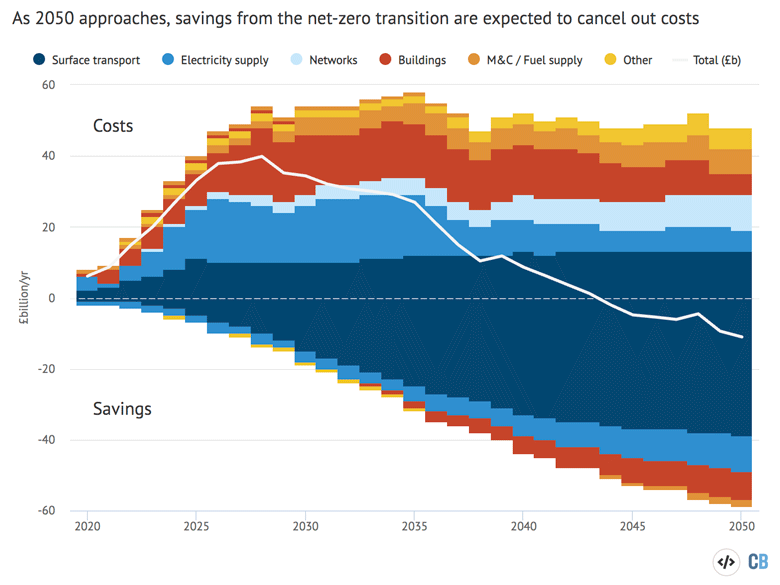
Net-zero is ‘economic opportunity of 21st century’ for UK, says Skidmore review
Josh Gabbatiss
01.17.23Josh Gabbatiss
17.01.2023 | 2:36pmNet-zero is “the economic opportunity of the 21st century”, according to an independent review commissioned by the UK government.
Undertaken by the Conservative former energy minister Chris Skidmore, the “mission zero” report includes 129 recommendations to “turbocharge” the nation’s climate action. More than half of them have a deadline of this year.
The proposals include a “solar and onshore wind revolution”, an earlier ban on the sale of new gas boilers and new targets for electric-car sales imposed on manufacturers.
The report contains frank criticism of the UK government, which it says is “not matching world-leading ambition with world-leading delivery”. It adds that inconsistent policymaking has led to missed opportunities for businesses.
The average household stands to save up to £6,000 by 2050 if current net-zero policies are implemented, according to new analysis conducted for the review. More ambitious policies could make these savings even higher – as much as £14,000 in total.
This pushes back against net-zero sceptics in the Conservative party and certain sections of the media. They have sought to portray the target as a financial burden on ordinary people and a contributor to the current energy crisis, which has, in fact, been caused by high gas prices.
Nevertheless, there are “genuine issues around affordability, accessibility and fairness”, the report says. A “strong response” from the government is required to address these concerns.
Carbon Brief has picked out the most noteworthy messages from Skidmore’s assessment – and compiled an interactive table that can be used to navigate his numerous proposals.
- Why has the net-zero review been produced?
- What are the review’s criticisms of the UK government?
- What key recommendations does the review make?
- What does the review say about the cost of net-zero?
- What has the response been from media and experts?
Why has the net-zero review been produced?
The UK government published its overarching net-zero strategy in autumn 2021, following a series of sector-specific plans that laid out a pathway towards net-zero emissions by 2050.
Since then, the nation has undergone political turmoil and been engulfed by a global energy crisis, largely driven by Russia’s invasion of Ukraine.
In light of these developments, during his short-lived career as the nation’s business and energy secretary in Liz Truss’ government, Jacob Rees-Mogg launched a review of the government’s approach to net-zero.
The main goal was to “better understand the impact of the different ways to deliver [the government’s] net-zero pathway on the UK public and economy and maximise economic opportunities of the transition”. Another aim was to “ensure that delivering the net-zero target does not place undue burdens on businesses or consumers”.
The review was initially seen as a potential threat to the UK’s climate action. At the time, prominent Conservative politicians and sections of the right-leaning press were calling for net-zero policies to be abandoned altogether, claiming incorrectly that climate policies were exacerbating the cost-of-living crisis. (In fact, as Carbon Brief analysis demonstrated, 96% of the increase in household energy bills last year was the result of rising gas prices.)
Despite this pressure, the government said it remained “committed” to the net-zero goal. It tasked Skidmore with undertaking the review, a former energy minister who had signed the net-zero target into law in 2019 and had become a prominent backbench campaigner for climate action.
‘Mission Zero’- The Net Zero Review has been published.
— Chris Skidmore (@CSkidmoreUK) January 13, 2023
Thanks to everyone who took part in the largest engagement exercise on net zero.
The 340 page report makes 129 recommendations to deliver net zero at scale and lower cost. Read the report here: https://t.co/mXWpauPtBS
The government has been repeatedly admonished by its own climate advisers, the Climate Change Committee (CCC), for falling short on the emissions-cutting targets it has set itself.
So far, the UK has achieved the legally binding “carbon budgets” that serve as “stepping-stone” targets on the way to net-zero emissions in 2050. However, in its last progress report the CCC said the government only had “credible” plans for 39% of the emissions cuts required to meet upcoming budgets.
Ministers have also come under fire in recent months for failing to take action that would ease the effects of the energy crisis as well as cutting emissions, such as insulating the UK’s leaky homes.
The new review received more than 1,800 submissions as part of the call for evidence, which Skidmore described as a “testament to the strong interest in delivering on net-zero”.
Rather than reporting on “undue burdens”, the review instead makes a firm case for the net-zero goal, concluding:
“Net-zero is the economic opportunity of the 21st century…Failure to compete globally risks missing this opportunity, seeing UK industries move away and other countries capturing the economic gains.”
This is an excellent review by @CSkidmoreUK – extensive engagement and a fresh expression of the economic case for Net Zero (and the competitiveness risks of going slow). Plaudits for focusing on the essential topic of ‘delivery’.
— Chris Stark (@ChiefExecCCC) January 13, 2023
Over to Government now.https://t.co/Qk2oqOwr1R
The conclusions arrive at an important moment, shortly before an end-of-March deadline for the government to produce a new version of its net-zero strategy.
This deadline stems from a July 2022 High Court ruling that the existing net-zero strategy is “unlawful” for failing to show the government’s workings on exactly how the target would be met.
What are the review’s criticisms of the UK government?
Skidmore’s review joins the chorus criticising the government for failing to live up to its net-zero commitments. It states:
“The review has seen persuasive evidence of the UK not matching world-leading ambition with world-leading delivery, with economic opportunities being lost due to a lack of consistent long-term policy or investment.”
Its core conclusion is that – far from net-zero being a problem – the government’s lacklustre performance on climate is putting the UK at a competitive disadvantage compared to the likes of the US and EU:
“We have heard from businesses that economic opportunities are being missed today because of weaknesses in the UK’s investment environment – whether that be skills shortages or inconsistent policy commitment”
Considering this review was ordered by Truss in light of soaring inflation, cost of living crisis, war in Ukraine and economy about to go down the pan, interesting it’s now urging ministers to go a hell of a lot further
— Natasha Clark (@NatashaC) January 12, 2023
It quotes evidence given by the Confederation of British Industry (CBI), which described “lag time to get projects up and running due to slow and inconsistent approaches to planning and consenting across technologies and regions [and] lack of clarity over clear delivery pathways and interim targets with key milestones for adoption”.
The report references past policy decisions that held back investment in low-carbon technologies, such as former prime minister David Cameron’s widely reported order to cut the “green crap”. It cites Carbon Brief analysis that found this resulted in higher energy bills today.
What key recommendations does it make?
The report is divided into two parts, the first of which essentially makes the case for net-zero.
It explains why net-zero is “the right target for the UK” and why the benefits of the goal outweigh its costs. (See: What does it say about the cost of net-zero?)
In addition, the document stresses that neither “net-zero by 2050” nor the 1.5C global temperature goal are “arbitrary targets”. It restates the science underpinning the 1.5C goal and the UK’s commitment to net-zero under the Paris Agreement.
The review also lays out why “significant additional government action is required to ensure that the UK achieves net-zero in the best way possible for the economy and the public”.
To this end, the second part of the report contains 129 policy recommendations for the government to consider. Of these, 74 include a deadline of 2023 and most of the remainder have deadlines within the following two years.
The review emphasises that these ideas are not intended to “reopen” the government’s approach to reaching net-zero, but rather to “turbocharge” opportunities to drive growth or bring down costs along this pathway.
(The review notes that the authors had access to the underlying modelling behind the government’s net-zero strategy, which had in turn been informed by “cost-minimisation, going with the grain of consumer choice and avoiding wasteful scrappage”.)
Carbon Brief has made an interactive table of the recommendations, including the government departments they have been assigned to and the proposed deadlines.
The vast majority of these activities – 104 in total – have been assigned to the Department for Business, Energy and Industrial Strategy (BEIS), either alone or in collaboration with other departments.
The Treasury also has a key role, with 18 recommendations, as well as the Department for Levelling Up, Housing and Communities (DLUHC) and Department for Environment, Food and Rural Affairs (Defra) with 16 each.
Skidmore writes in his introduction to the report that he understands the government “will not be able to accept every recommendation” and that some will require more engagement with industry and communities:
“However, where it can act now, we argue that the costs of doing so will be less if action is taken sooner.”
With this in mind, the review also lays out 25 policies that are particularly important and “could be realistically delivered by 2025”. These policies have been highlighted green in the table above.
Overall, some notable recommendations include…
Delivery of net-zero
An overarching message throughout the document is that the UK needs “a step change in how we plan, build and operate key infrastructure that will underpin the transition”, with a need for certainty and a stable environment for businesses.
There are calls throughout to “reform the local planning system at [the] local and national level to ensure it properly supports net-zero”. The need for this is “one of the starkest messages” to emerge from consultations, it says.
The review emphasises the importance of “strong regulatory signals” to drive decarbonisation, giving the examples of the 2030 ban on fossil-fuel powered cars and the “contracts for difference” low-carbon electricity auctions. It recommends a review of regulations for emerging net-zero technologies “to enable their rapid and safe introduction”.
It also calls for new bodies to oversee all of this, including a new Office for Net-Zero Delivery to cover cross-departmental priorities. The review also proposes net-zero select committees in both houses of parliament, which would act as the “dedicated receiver” of new CCC progress reports, among other things.
Other overarching priorities mentioned include an all-encompassing net-zero finance strategy, improved data collection for net-zero, a review of how the tax system incentivises decarbonisation – as previously recommended by the CCC – and a review of the UK’s climate international leadership.
Electricity
The review calls for a “revolution” in the roll-out of solar and onshore wind, including “deployment roadmaps” with “clear milestones”. However, while solar is given a set target – 70 gigawatts (GW) by 2035 – the goal for onshore wind is to reach “required deployment levels for 2035 net-zero grid”. Within this, it specifically calls for a “rooftop revolution”, with no planning permission required to install solar on the rooftops of homes or businesses.
Investment in new nuclear power plants is described as a “no-regrets option”. It calls for an accelerated setup of Great British Nuclear, the body proposed to support the UK’s nuclear industry, in early 2023. The review calls for a clear roadmap later in the year for reaching a final investment decision on further new nuclear projects in the next parliament.
It also pushes for the government to outline a “clear approach” by the end of 2023 to “rebalancing” the costs of electricity and gas, so that the price of electricity provides “a clear signal to encourage use of low-carbon technologies”. (See: What does it say about the cost of net-zero?)
(At present, climate and social policy costs are paid via electricity bills, which are also subject to carbon pricing. Gas bills face near-zero policy costs and, with no carbon price, implicitly subsidise emissions. Rebalancing means shifting the distribution of these costs.)
Homes
The review calls for “a legislative target for gas-free homes and appliances by 2033”. This would include bringing forward the current phaseout date for sales of new gas boilers forward from 2035 to 2033. It urges the government to “create the conditions for sustained growth of new markets for low-carbon heat”, specifically heat pumps.
It would also include legislating for all homes sold by 2033 to have an EPC rating for energy efficiency of “C” or above. In addition, there is a proposal for landlords to be mandated to include “average bill cost” alongside the EPC rating, when letting a property out.
This would be raised to EPC B for all existing non-domestic buildings by 2030, and for all newly built non-domestic buildings by 2025. Financial support for those who need it to reach the proposed regulatory standards would come from extensions of existing grant schemes.
The review does not directly oppose hydrogen for heating, noting that the government “should continue the hydrogen heating community trials” that are underway. However, it says that, by the end of 2023, the government should update its cost analysis to “ensure that the case for economic optimality and feasibility still holds”.
(One recent study suggested hydrogen heat would be nearly twice as expensive as existing gas boilers. Another found using hydrogen to heat most UK homes would cost 73% more than relying on heat pumps and district heating. The International Energy Agency recently concluded that heat pumps would be the “central technology” for low-carbon heat.)
Transport
The most prominent transport-related proposal is for a “swift delivery” of the government’s proposed zero-emissions vehicle mandate, which would require manufacturers to sell a rising quota of electric cars from 2024.
In a bid to remove one perceived barrier to electric car sales, the report says VAT on public and private electric vehicle charging should be equalised in 2024. (Domestic electricity usage is subject to a reduced rate of 5% VAT whereas public chargers pay 20%.)
Notably, the review breaks with past government messaging and says it is “important that the government considers how congestion can be avoided”. It includes proposals for public and active transport to help curb traffic in the UK. While acknowledging “calls” for road pricing to be used to discourage driving, the review stops short of supporting it.
The report does not mention cutting demand for flights – a long-standing taboo subject for the government – or include many suggestions for decarbonising aviation generally. One of the terms of the review was to explore how to “minimise costs borne by businesses and consumers” – and cutting emissions from aircraft is expected to be expensive.
However, the review does recommend that the planned low-carbon fuels strategy should be published this year, alongside legislation for a sustainable aviation fuels (SAF) mandate to apply from 2025.
There is also mention of the government creating a “carbon calculator” so people can inform themselves about the climate impact of their lifestyle choices. Conservative governments have historically been reluctant to intervene in – or be seen to “nanny” – people’s lives.
As well as driving investment in new tech and fuels, Gov’t needs to engage with the public about net zero, the report argues, including better information provision through the creation of a Carbon Calculator. AEF strongly supports better public info on flight emissions! [2/2]
— The Aviation Environment Federation (@The_AEF) January 13, 2023
Oil and gas
While emphasising the importance of low-carbon energy, the review also says: “In the short term we still need oil and gas to secure our energy independence and as transition fuels towards 2050. We will continue to be dependent on gas and its wholesale price for multiple years.”
With this in mind, it includes some proposals to cut the emissions produced while extracting fossil fuels. Notably, it proposes an end to routine gas flaring in 2025, rather than 2030 as currently planned.
The review also says the government should consider making domestic fossil-fuel producers store 10% of their carbon dioxide (CO2) emissions in geological formations by 2035 at the latest. (It is not clear if this 10% covers emissions during fossil fuel extraction alone or also during the use of products.)
Geological removal is considered more permanent than capturing CO2 by growing trees and other “nature-based solutions”, which are often used to create cheap carbon offsets.
What’s not clear is the scope. If it’s based on domestic fossil fuel production emissions, that’s only an obligations for approximately 0.4 MtCO₂ by 2035.
— Harry Smith (@harry_b_smith) January 13, 2023
If based on all fossil fuel combustion from domestic producers, that could be as high as 8 MtCO₂.
More broadly, the document also says the government should “recognise the importance of geological net-zero and work to align international ambitions toward geo zero by 2050, in line with net-zero”.
This is an idea that has been championed by University of Oxford climate scientist Prof Myles Allen, who has described returning CO2 to the planet’s crust as the “bare minimum” a wealthy nation with high historical emissions should be committing to.
Food, nature and land
The report urges the government to publish its anticipated land-use framework as soon as possible – and by mid-2023 at the latest. This is significant due to the importance of UK land not only for farming and nature, but also for building low-carbon infrastructure.
It also calls for the full details of the long-awaited environmental land management schemes (ELMS), the subsidy system for farmers that is meant to replace the EU regime, by the end of 2023. Farmers have complained that the lack of clarity around ELMS has made it hard for them to invest in “climate-friendly” measures.
The review does not include much detail on tree planting, despite the government being on course to miss its targets by a wide margin. However, it does propose expanding reporting of emissions for greenhouse gas inventories beyond forests and peatlands to other habitats, such as saltmarshes, in order to drive support for “habitat creation and restoration efforts”.
It also urges the government to take action on setting voluntary carbon market standards and “ensure a pipeline of investable nature-based solutions projects is available” for this market.
In line with the government’s past positions, the review does not explicitly discuss encouraging people to eat less meat – despite consistent warnings from official advisers that dietary changes should be part of the route to net-zero. However, it does recommend that the government should pursue “ecolabelling” to help people “make more informed purchasing decisions”.
With its focus on “turbocharging growth”, the Skidmore review of net-zero has some notable omissions…
— Josh Gabbatiss (@Josh_Gabbatiss) January 16, 2023
❌✈️ Nothing on cutting flight numbers
❌ 🥩 Nothing specifically targeting meat consumption
Both have been repeatedly highlighted as blind spots in UK net-zero plans…
What does it say about the costs and benefits of net-zero?
The costs and benefits of reaching net-zero emissions have been a political talking point since the goal became law in 2019.
At the time, the CCC said meeting the target would cost 1-2% of GDP, but would bring “large benefits”, including reduced climate damages and cleaner air.
Crucially, this 1-2% figure was the amount that would need to be invested in the transition rather than an estimate of any impact it might have on the overall size of the UK economy, including net benefits.
Since then, the economic case for net-zero has strengthened as low-carbon technologies have continued to become cheaper while fossil fuel prices have soared. In its latest progress report, the CCC said reaching net-zero would save 0.5% of GDP if gas prices remained high.
Yet right-leaning newspapers, as well as climate-sceptic lobbyists and Conservative MPs have often called for the target to be scrapped altogether, claiming it will impose high costs on households and the wider economy.
Skidmore’s report is emphatic that while the UK requires a huge amount of investment to meet its net-zero goals – rising to £50-60bn per year by the early 2030s – “ultimately, the benefits of net-zero will outweigh the costs”.
It refers to work by the consultancy Cambridge Econometrics for the CCC, which found that the UK would, in fact, see around 2% additional GDP growth due to new jobs, increased economic activity, lower fossil fuel imports and cost savings such as reduced household bills.
The review emphasises that almost half of the government’s net-zero strategy requires public action, such as purchasing electric cars and installing home insulation.
However, new analysis carried out for the report concludes that these net-zero measures would save the average household a cumulative total of £400-£6,000 by 2050.
New net-zero review by @CSkidmoreUK finds the average UK household will save £400-6,000 cumulatively by 2050 in the net-zero transition, because:
— Josh Gabbatiss (@Josh_Gabbatiss) January 13, 2023
🚗 Electric vehicles are cheaper to run
🏡 Home insulation will cut heating bills
♨️ Heat pumps can be cheaper to run than boilers
It adds that “with some of the policies suggested in the review, this could go further”. In particular, if policy costs are moved from electricity to gas bills, the savings for households could be as high as £14,000.
In addition, it notes that households could add, on average, £10,000 to the value of their property with energy-efficiency improvements and low-carbon heating.
The report also responds directly to false climate-sceptic claims that the energy crisis is partly the result of climate policies. It says:
“There have been some suggestions that the path to net-zero increased household energy costs or the UK’s vulnerability to the kind of dramatic shock seen in Ukraine. The evidence does not support either assertion.”
In fact, modelling commissioned for the review shows high fossil fuel prices “makes the case for net-zero even stronger,” it says.
However, the gains from net-zero will not be immediate. The review emphasises the average household in 2040 will likely have shouldered a cumulative cost of £4,000-£6,000 due to “long payback periods from the investments” – such as energy savings from home insulation.
This can be seen in the chart below, which is based on analysis undertaken for the CCC and shows savings cancelling out costs in 2043. (Note that the analysis was carried out before the energy crisis substantially raised fossil fuel prices. Savings due to reduced fossil fuel use are, therefore, likely to be higher than expected in this analysis.)

These high up-front costs mean that even for some people who stand to save money, the changes “won’t feel worthwhile”, the report notes. This means “government must take action to reduce costs and address these multiple barriers”, adding:
“It is vital that government takes action to ensure the distributional impacts of the net-zero transition do not unfairly fall on certain groups or those living in certain locations, exacerbating inequalities.”
In particular, it emphasises that support for low-income households “remains essential”.
The report finds that in scenarios where policy costs are applied to gas bills and new gas boilers are banned beyond 2033, 450,000 households would not make an overall saving from net-zero by 2050. These consist of low-income social housing tenants and low-income owner occupiers who live in urban areas and are on the gas grid.
However, it also finds that government support amounting to £900m over the whole course of the transition – just £2,000 per household in this group – could allow them to “break even”.
Crucially, the report points out that existing estimates of the economic impact of cutting emissions miss out “a number of critical factors which are difficult to model effectively or depend on how net-zero is delivered rather than whether it happens at all”.
Specifically, this refers to the benefits of transitioning to a net-zero society, which include everything from warm homes to clean air. This, in turn, could benefit the economy – for example, by cutting NHS costs due to improved health.
Finally, the review notes that existing cost-benefit assessments tend to ignore the benefits of avoiding dangerous climate change by cutting emissions. As such, it says:
“[These assessments] do not reflect the risk and disruption of not acting, which would run so clearly counter to the prevailing expectations of business and global trends.”
In a high-emission future where climate change is not being adequately addressed, the report says “the level of global disruption will be so severe that ‘normal’ economic activity seems very challenging”.
It cites work by insurance company Swiss Re that concludes the global economy already faces damages equivalent to 11% of GDP if emissions rise as expected under existing policies, relative to a world without climate change.
What has the response been from media and experts?
The document was leaked to – or deliberately placed with – the media and was, as a result, published three days earlier than planned.
Initial reporting focused on the criticism Skidmore – the “net-zero tsar” – had levelled at his former colleagues in government, as well as some of the more eye-catching specific policy recommendations.
In particular, the idea of bringing the gas-boiler ban forward from 2035 to 2033 made headlines in the Daily Telegraph, the Times, MailOnline and the Independent.
TELEGRAPH: Net zero plan to ban gas boilers in a decade #TomorrowsPapersToday pic.twitter.com/BVKPwCDNV3
— Neil Henderson (@hendopolis) January 12, 2023
Given the persistence of the “cost of net-zero” as a talking point among right-leaning newspapers, it was, perhaps, unsurprising that some of them focused on this aspect of the document.
Despite the report’s overall positive tone about the benefits of net-zero outweighing the costs, the Sun’s coverage led on the “half a million poor families left out of pocket unless they get more cash help”. (See: What does it say about the cost of net-zero?). A Sun editorial labelled the review “the traditional mix of fantasy and denial”.
So the review says the government "must take action to reduce costs".
— Josh Gabbatiss (@Josh_Gabbatiss) January 13, 2023
About 1.6% of households – 450,000 in total – do not stand to save money from the net-zero transition.
But the review says £900m in subsidies – just £2,000 per household – would mean these people break even. pic.twitter.com/rDCP3rZ5j0
The Daily Telegraph highlighted the high up-front costs of net-zero measures, such as replacing boilers. The newspaper also quoted the influential energy economist Prof Dieter Helm, who said the government estimates of net-zero costs are “highly speculative”, with the financial burden “likely to be much higher”.
(Helm infamously said in 2014 that offshore wind would “never” be economic. It is now one of the cheapest forms of electricity generation in the UK and significantly cheaper than gas.)
Another Daily Telegraph article quoted Prof David Reiner, assistant director of the energy policy research group at the University of Cambridge, who echoed this sentiment, estimating that the up-front costs of net-zero for consumers will likely be double Skidmore’s figures.
Climate-sceptic columnist Ross Clark took aim at Skidmore in an opinion piece for the Daily Telegraph, calling the report “a triumph of messianic zeal over reality”. He, too, is critical of “the fantasy that Britain’s net-zero target is going to make us fabulously rich”.
Skidmore himself also had a comment piece in the Daily Telegraph, in which he concluded:
“We have reached a tipping point. The risks of ‘not zero’ are now greater than the associated risks of taking decisive action on net-zero now.”
The Financial Times quoted business and energy secretary Grant Shapps, whose department would be responsible for most of the action proposed in the review, saying: “I am grateful to Chris Skidmore for his detailed report today, which offers a range of ideas and innovations for us to consider as we work to grasp the opportunities from green growth.”
The response to the review by NGOs and business groups alike was overwhelmingly positive, with many emphasising that the government needed to act on it fast. “The ball is now in Rishi Sunak’s court,” said a press statement from E3G senior policy adviser Juliet Phillips, referencing energy-efficiency measures in particular as an area of focus.
Analysis by the Guardian’s Fiona Harvey and Helena Horton described what they saw as a “stinging broadside against the government” by Skidmore, who they noted did not intend to stand again as a Conservative MP at the next election:
“His review argues that the Conservatives have failed on nearly every aspect of net-zero policy. Though it is cloaked in polite language, and couched in terms of constructive suggestions rather than hard-hitting new policy demands, there is little in its 320 pages to show the government is on track on any of the wide range of policies needed.”
Writing in the i newspaper, policy editor Jane Merrick asked whether Sunak is “politically strong – and brave – enough to make the case [for net-zero] before the next election”.
-
Net-zero is ‘economic opportunity of 21st century’ for UK, says Skidmore review





